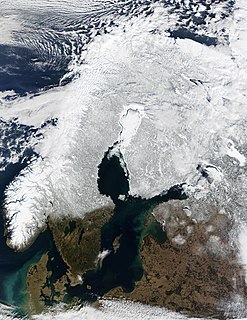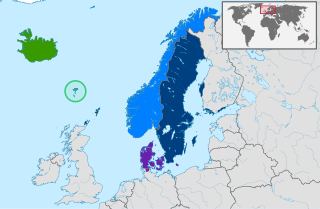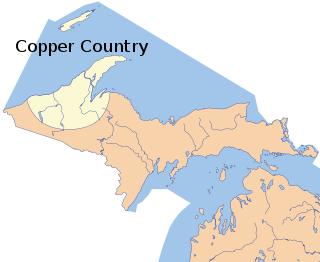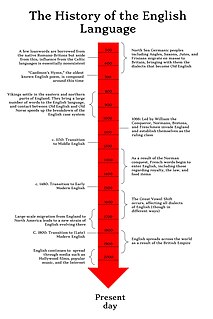
Scandinavia is a subregion in Northern Europe, with strong historical, cultural, and linguistic ties. The term Scandinavia in local usage covers the three kingdoms of Denmark, Norway, and Sweden. The majority national languages of these three belong to the Scandinavian dialect continuum, and are mutually intelligible North Germanic languages.

The Upper Peninsulaof Michigan – also known as Upper Michigan or colloquially the U.P. – is the northern and more elevated of the two major landmasses that make up the U.S. state of Michigan, the other being the Lower Peninsula. It is bounded primarily by Lake Superior to the north, separated from the Canadian province of Ontario at the east end by the St. Marys River, and flanked by Lake Huron and Lake Michigan along much of its south. The Straits of Mackinac separate it from the Lower Peninsula of Michigan to the south. Although the peninsula extends as a geographic feature into the state of Wisconsin, the state boundary follows the Montreal and Menominee rivers and a line connecting them.

Copper Island is a local name given to the northern part of the Keweenaw Peninsula, separated from the rest of the Keweenaw Peninsula by Portage Lake and the Keweenaw Waterway.
Eh is a spoken interjection in English that is similar in meaning to "Excuse me?," "Please repeat that", or "Huh?". It is also commonly used as an alternative to the question tag right?, i.e., method for inciting a reply, as in "It's nice here, eh?". In North America, it is most commonly associated with Canada and Canadian English, and the area stretching from northern Wisconsin up to Michigan's Upper Peninsula. Similar interjections exist in other languages, such as Dutch, Azerbaijani, Armenian, Hokkien Chinese, Japanese, French, Finnish, Italian, Greek, Hebrew, Malay, Spanish, Persian, Portuguese, Arabic, Turkish, Swahili, Korean, Catalan and Filipino.

Hancock is a city in Houghton County in the U.S. state of Michigan. It is located across the Keweenaw Waterway from the city of Houghton on the Keweenaw Peninsula. The population was 4,634 at the 2010 census. The city has been consistently ranked as the third-snowiest city in the United States by The Weather Channel.

The North Germanic languages make up one of the three branches of the Germanic languages—a sub-family of the Indo-European languages—along with the West Germanic languages and the extinct East Germanic languages. The language group is also referred to as the "Nordic languages", a direct translation of the most common term used among Danish, Faroese, Icelandic, Norwegian, and Swedish scholars and laypeople.

The Keweenaw Peninsula is the northernmost part of Michigan's Upper Peninsula. It projects into Lake Superior and was the site of the first copper boom in the United States, leading to its moniker of "Copper Country." As of the 2000 census, its population was roughly 43,200. Its major industries are now logging and tourism, as well as jobs related to Michigan Technological University and Finlandia University.

The Copper Country is an area in the Upper Peninsula of Michigan in the United States, including Keweenaw County, Michigan, Houghton, Baraga and Ontonagon counties as well as part of Marquette County. The area is so named as copper mining was prevalent there from 1845 until the late 1960s, with one mine continuing through 1995. In its heyday in the latter half of the 19th century and the early 20th century, the area was the world's greatest producer of copper.

English is a West Germanic language that originated from Anglo-Frisian dialects brought to Britain in the mid 5th to 7th centuries AD by Anglo-Saxon migrants from what is now northwest Germany, southern Denmark and the Netherlands. The Anglo-Saxons settled in the British Isles from the mid-5th century and came to dominate the bulk of southern Great Britain. Their language, now called Old English, originated as a group of Anglo-Frisian dialects which were spoken, at least by the settlers, in England and southern and eastern Scotland in the early Middle Ages, displacing the Celtic languages that had previously been dominant. Old English reflected the varied origins of the Anglo-Saxon kingdoms established in different parts of Britain. The Late West Saxon dialect eventually became dominant. A significant subsequent influence on the shaping of Old English came from contact with the North Germanic languages spoken by the Scandinavian Vikings who conquered and colonized parts of Britain during the 8th and 9th centuries, which led to much lexical borrowing and grammatical simplification. The Anglian dialects had a greater influence on Middle English.
The term Finglish was coined by professor Martti Nisonen in the 1920s in Hancock, Michigan, to describe a mixture of Finnish and English he encountered in America. The word is first recorded in English in 1943.

Copper Harbor is an unincorporated community, census-designated place, and all-season resort town in northeastern Keweenaw County in the U.S. state of Michigan. It is within Grant Township on the Keweenaw Peninsula which juts out from the Upper Peninsula of Michigan into Lake Superior. Due to its natural environment and surroundings, Copper Harbor is marketed as a tourist destination within the Great Lakes region. Its population was 108 as of the 2010 census.

Regional vocabulary within American English varies. Below is a list of lexical differences in vocabulary that are generally associated with a region. A term featured on a list may or may not be found throughout the region concerned, and may or may not be recognized by speakers outside that region. Some terms appear on more than one list.
North-Central American English is an American English dialect native to the Upper Midwestern United States, an area that somewhat overlaps with speakers of the separate Inland North dialect, centered more around the eastern Great Lakes region. The North Central dialect, often popularly though stereotypically recognized as a Minnesota accent, most strongly stretches from the Upper Peninsula of Michigan to eastern Montana, including most of Wisconsin, the northern half of Minnesota, some of northern South Dakota, and most of North Dakota; however, many speakers of the dialect are also found scattered throughout Minnesota, the Dakotas, and Wisconsin, as well as in the northern half of Iowa.
Sam Hill is an American English slang phrase, a euphemism or minced oath for "the devil" or "hell" personified, the "Sam" coming from salmon(sal mon an oath) and "Hill" from hell. Etymologist Michael Quinion and others date the expression back to the late 1830s; they and others consider the expression to have been a simple bowdlerization, with, according to the Oxford English Dictionary, an unknown origin.
Chippewa is an Algonquian language spoken from upper Michigan westward to North Dakota in the United States. It represents the southern component of the Ojibwe language. Its ISO-3 designation is "ciw".

Finnish is a Uralic language of the Finnic branch spoken by the majority of the population in Finland and by ethnic Finns outside Finland. Finnish is one of the two official languages of Finland. In Sweden, both Finnish and Meänkieli are official minority languages. The Kven language, which like Meänkieli is mutually intelligible with Finnish, is spoken in Norway's Finnmark by a minority group of Finnish descent.

Toivola is an unincorporated community in Houghton County, Michigan, United States. The far-flung rural community is divided between Stanton Township, Adams Township, and Bohemia Township. It is found along M-26, 8 miles (13 km) southwest of South Range, 16 miles (25.7 km) from Houghton, and 35 miles (56 km) from Ontonagon. Toivola has a post office with ZIP code 49965. The community's historic industries include mainly agrarian uses and lumbering.
Kalix is a divergent Swedish dialect spoken in the Kalix Municipality along with Sami, Finnish, Meänkieli, and the national standard language Swedish. Like other Scandinavian languages, the Kalix dialect originates in Proto-Norse and dialects of Old Norse, spoken by immigrating Germanic settlers during the Viking Age. It has three grammatical genders, two plural forms of indefinite nouns, and broad usage of definite nouns. Nouns are also inflected differently in dative and accusative case, and there are three forms of expressing genitive. Most verbs are conjugated differently in singular and plural, while most adjectives are not. Some adjectives can though be serially joined with nouns and some have two plural forms. A pleonastic article is also always used before people's and pet's names.












